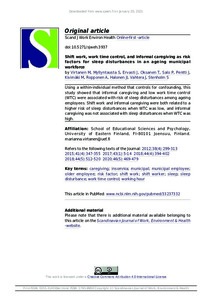Shift work, work time control, and informal caregiving as risk factors for sleep disturbances in an ageing municipal workforce
Virtanen M; Myllyntausta S; Ervasti J; Oksanen T; Salo P; Pentti J; Kivimäki M; Ropponen A; Halonen JI; Vahtera J; Stenholm S
Shift work, work time control, and informal caregiving as risk factors for sleep disturbances in an ageing municipal workforce
Virtanen M
Myllyntausta S
Ervasti J
Oksanen T
Salo P
Pentti J
Kivimäki M
Ropponen A
Halonen JI
Vahtera J
Stenholm S
Julkaisun pysyvä osoite on:
https://urn.fi/URN:NBN:fi-fe2021042612454
https://urn.fi/URN:NBN:fi-fe2021042612454
Tiivistelmä
Objectives This study aimed to examine the contribution of shift work, work time control (WTC) and informal caregiving, separately and in combination, to sleep disturbances in ageing employees. Methods Survey data were obtained from two prospective cohort studies with repeated measurements of working conditions, informal caregiving, and sleep disturbances. We used fixed-effect conditional logistic regression analysis to examine whether within-individual changes in shift work, WTC and informal caregiving were associated with changes in sleep. Secondary analyses included between-individuals comparison using standard logistic regression models. Results from the two cohorts were pooled using meta-analysis. Results Low WTC and informal caregiving were associated with sleep disturbances in within-individual analyses [odds ratios (OR) ranging between 1.13 (95% confidence interval 1.01-1.27) and 1.48 (95% CI 1.29-1.68)] and in between-individuals analyses [OR 1.14 (95% CI 1.03-1.26) to 1.33 (1.19-1.49)]. Shift work alone was not associated with sleep disturbances, but accumulated exposure to shift work, low WTC and informal caregiving was associated with higher risk of sleep disturbances (OR range 1.21-1.76). For some of the sleep outcomes, informal caregiving was related to a higher risk of sleep disturbances when WTC was low and a lower risk when WTC was high. Conclusions Informal caregiving and low WTC are associated with risk of sleep disturbances among ageing employees. The findings also suggest that low WTC in combination with informal caregiving may increase the risk of sleep disturbances whereas high WTC may alleviate the adverse impact of informal caregiving on sleep.
Kokoelmat
- Rinnakkaistallenteet [29256]
